In this episode, Dr. Ron Hunninghake and Dr. Dustin Moffitt discuss the lingering symptoms and complications known as Long Covid. They talk about the potential long-term effects of infection and introduce some potential treatment options.
Thank You to This Episode’s Sponsor

Episode Transcripts
**Disclaimer: The information contained on the Real Health Podcast or this website and the resources mentioned are for educational purposes only and are not intended as, and shall not be understood or construed as, medical or health advice. The information contained on this podcast is not a substitute for medical or health advice from a professional who is aware of the facts and circumstances of your individual situation. Information provided by hosts or guests on the Real Health Podcast or the use of any products or services mentioned DOES NOT create a practitioner/patient relationship between you and any persons affiliated with this podcast. Always speak with your physician or other healthcare professional before taking any medication or nutritional, herbal or homeopathic supplement, or using any treatment for a health problem. If you have or suspect that you have a medical problem, contact your health care provider promptly. Do not disregard professional medical advice or delay in seeking professional advice because of something you have read on this web site. Information and statements regarding dietary supplements have not been evaluated by the Food and Drug Administration and are not intended to diagnose, treat, cure, or prevent any disease.
Intro: This is the real health podcast brought to you by Riordan clinic. Our mission is to bring you the latest information and top experts in functional and integrative medicine to help you make informed decisions on your path to real health.
Dr. Ron Hunninghake: Well, welcome everyone. This is Dr. Ron Hunninghake. I’m the Chief Medical Officer at Riordan Clinic, and I’m pleased to have Dr. Dustin Moffitt who is our doctor up at the Hays Riordan Clinic satellite office. And we’re here today to talk about the underpinnings of a new phenomenon, which may not be that new called a long haul COVID. So this is evidence currently a situation where someone who has had the COVID infection, they recover, but they are hit with a number of chronic symptoms. So, Dr. Moffitt what kind of symptoms do you encounter or what have you read or heard about that characterize this long haul COVID or some people just call it long COVID.
Dr. Dustin Moffitt: Probably the two most common that I see are fatigue or long-lasting shortness of breath. Occasionally I’ve seen some palpitations come up, which is like the heart skipping, a beat. We’ve seen joint pain, but these are all pretty typical things that can happen with almost any long-term type of illness.
Dr. Ron Hunninghake: I think people also have trouble with their digestive systems and like your bowel type things. They have fogginess, their memory is not as good. They can have sleep disruption and some psychiatric type things like anxiety and depression that they had never had before.
So it’s a bit scary for the general public when they think about, you know, obviously the COVID infection itself is bad enough. The danger of actually dying. There are so many people dying, but then even people that recover, they’ve got a long haul ahead of them in terms of trying to get over this. So, what we wanted to talk about today is a little bit about how the Riordan clinic deals with any kind of post infectious disease or syndrome. And so I think, don’t you pretty much recognize that there’s a number of post-infectious disease syndromes. What sort of things have you encountered in your practice?
Dr. Dustin Moffitt: The two most common would probably be chronic Epstein-Barr virus, which is after a mono infection, and chronic Lyme disease. Those are probably two, the most common that we would see here in this clinic.
Dr. Ron Hunninghake: A lot of the fibromyalgia patients that I’ve seen will report that it started after the flu or after some more serious infections. So, so what, go ahead.
Dr. Dustin Moffitt: That pairs greatly with what you were saying with the gut. Uh, earlier I would say a very large majority of my fibromyalgia patients improved just by addressing the gut health almost alone. Now, granted there’s always outliers. But the gut is a huge proponent of our immune system. Wow. What are the studies saying up to about 80% of our immune system cells are, are made straight in the gut.
Dr. Ron Hunninghake: What I’m reading is that there are now people having the long haul COVID and they’re looking for help. And what’s happening is a lot of doctors have not encountered this before. And so the tendency is to treat the symptoms with pain medicine for the aches and pains, antispasmodics for the irritable bowel, antidepressants for the depression. There really is not a good medicine for chronic fatigue. So what, what do you think Riordan clinic has to offer these people? Do you think it ties in to how we’ve approached people in the past?
Dr. Dustin Moffitt: It does. So I don’t know that this chronic illness would be much different than an approach that we look at all of our chronic illnesses. So we can take a step back and say, okay, what’s going on? Are there a lot of lifestyle factors that are coming into play? Like, um, they live a very stressful life and then obviously being in a time of a stressed economy and a new pandemic going on, is that contributing to depression or anxiety, or is it the stress that made their hormones tank that now they’re having extreme anxiety? Are they entering time of perimenopause? So everything compounds up, but then taking the setback of chronic illness, let’s say we have all these essential nutrients in our body that make ourselves function. And in times of chronic illness, we’ll see a rapid depletion of who knows what nutrients, but that’s where testing comes into play on
Dr. Ron Hunninghake: Also, the, the strange phenomenon of people losing their smell and their taste that could be a sudden drop in there. There may be meager zinc reserves. A lot of people are running low in zinc. And so this is an illustration of one of the nutrients.
Dr. Dustin Moffitt: It could be going low or just even a simple, uh, offsetting of some of the electrolytes in the body. Uh, the nerve is a conductor and without the electrical charge to transmit, it’s not be balanced and not be able to receive the messages of smell
Ad: There’s a lot more to this conversation and it’s coming up right after the break
Today’s podcast is brought to you by LivOn labs makers of liposomal vitamins and supplements. LivOn uses a liposomal encapsulation technology to protect nutrients from destruction in the digestive system. This allows for more efficient delivery of essential vitamins and nutrients. Choose from various supplements that support health and wellbeing such as lypospheric vitamin C, magnesium, glutathione, and more. To learn more visit LivOn labs. That’s L I V O N labs.com
Dr. Ron Hunninghake: Plus, people when they’re sick seriously ill. Well, the tendency of standard medicine is to use antibiotics. You know, when they’re, especially if there’s a fever, uh, and even if you don’t know what the infecting agent is, even if it’s thought to be a virus, the idea is taking antibiotics, prevent co-infections, but that could also disrupt the gal, the bowel flora even further, uh, in this situation.
Dr. Dustin Moffitt: Well, and that kind of goes with COVID currently. I mean, they’ve been using this information center doxycycline and seeing some results by shortening COVID, but now they’re making those symptoms go away. Short-term but long-term, what is that going to do? Um, we know that one round of antibiotics can take the gut biome, the bacteria that are in there up to about two years to reestablish itself from one simple round of antibiotics. Now, to go back to the azithromycin and doxycycline, the speculated reason of how it’s helping what’s COVID is that it reduces overall inflammatory load driven by other potentially killed infections, as you were saying.
Um, and that that’s part of our testing. Oftentimes we’ll look at underlying inflammatory markers. Um, there are tons of different ones that can be ran. We tend to run certain sets, and then if those come back positive, we’ll look for other reasons, uh, why that inflammation in the body is elevated.
Dr. Ron Hunninghake: Many of these patients, uh, probably were immune compromised to begin with with either chronic diabetes, or they may, like you said, serious stress, sleep disorders, obesity, lack of activity, lack of sunshine, low vitamin D. All these things are root causes that they got by with, uh, when life was fairly level, but when they get hit with one of these serious infections, especially COVID, uh, all of these, uh, these deficiencies in a sense gang up on that person and make them a sitting duck for a turning in turning an acute problem into a chronic problem.
Dr. Dustin Moffitt: I agree a lot of the hospitalization studies are coming out with COVID related deaths. They’re showing that just vitamin D status alone being low has a very high correlation with death percentages. And then just by improving the serum status of vitamin D by only 10 points that death rate dropped by almost 20%.
Dr. Ron Hunninghake: Yeah. Well, Dr. Reardon, who was the founder of the Riordan clinic was big on measurement. He basically says, unless you measure something, you can’t manage it. And so, uh, so what, what would be some of the tests that we would do here at Riordan clinic that would help elucidate the underlying causes of this, uh, long haul COVID or any other chronic infectious problems?
Dr. Dustin Moffitt: That’s really where our real health panel could step in. As we look at almost every metabolic marker that that’s needed. Um, and what’s that vitamins minerals, amino acids.
We have a lot of inflammatory driving agents on there, some specific anti-inflammatory measurements, of course, vitamin C is going to be on there. Um, it seems to be a universal trigger for many conditions, uh, or at least conjunctive treatment. Um, and then from there, we can potentially, let’s say that COVID led to gut symptoms. We can look at doing stool analysis, if they have chronic illness, even before this started, but COVID just seemed to compound on that. We could start looking at other co-infections that could be going on or environmental status, like chemical or heavy metal toxicity. Uh, any, any of them that I’ve kind of missed that you would run.
Dr. Ron Hunninghake: Those are probably the main ones. Uh, I was wondering, I know people who are listening in and they’ll say, well, great, let’s get all those things measured, but is there anything we can do acutely?
What can we do right away that can help people start to feel better?
Dr. Dustin Moffitt: Start eating a good well-rounded diet. That’s going to nourish your body. Move your body, get some exercise or movement of some sort. Make sure you’re getting adequate sleep. Manage stress. Then there are certain nutrients that you can be taking. Vitamin D we know is probably one of the best and vitamin C. There are others. We have our immune support protocol posted on our website, Riordanclinic.org. You can always look towards that.
Dr. Ron Hunninghake: Even though we can’t say that intravenous vitamin C is a specific treatment for COVID, what we do know that every creature when it’s stressed or injured or fatigued, it will start making more vitamin C on its own, but we can’t do that as humans. We can take more, but the gut can be somewhat of a limitation, but using intravenous vitamin C in these higher doses is very well tolerated and provides some quick relief of a scurvy like syndrome.
You know, it’s interesting if you just look at scurvy, a lot of the fatigue, the poor healing, the inflammation, all that could just be related scurvy alone and magnesium deficiency, which is another component of the Riordan IVC protocol. So these are all things that, I think we have to offer patients. And we sure invite people to check with Dr. Moffitt up in Hays. We have free contact time. You can find it on our website to call in and discuss this with us. So what any last words here, Dr. Moffitt that can give patients a sense of encouragement about this long haul COVID?
Dr. Dustin Moffitt: With any chronic illness don’t ever lose hope there’s always hope out there somewhere, um, and we’re here to help any way we can.
Dr. Ron Hunninghake: All right. Very good. Thank you so much. And thank you everyone for listening. This is Dr. Ron Hunninghake for the Riordan clinic, signing off for now.
Outro: Thank you for listening to the Real Health Podcast. If you enjoyed this episode, be sure to subscribe and leave us a review. You can also find all of the episodes and show notes over at realhealthpodcast.org. Also be sure to visit Riordanclinic.org, where you will find hundreds of videos and articles to help you create your own version of real health.


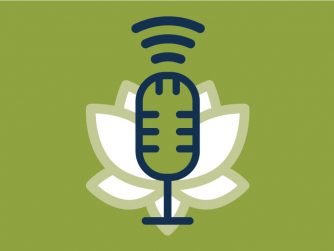
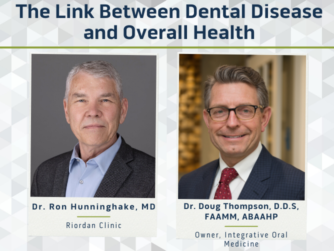
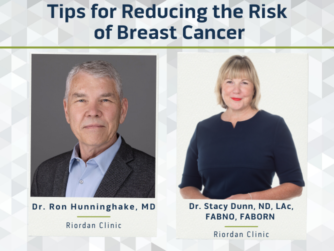
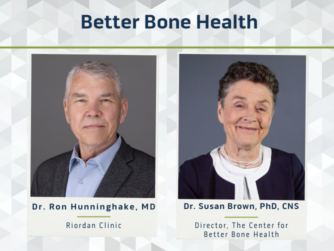
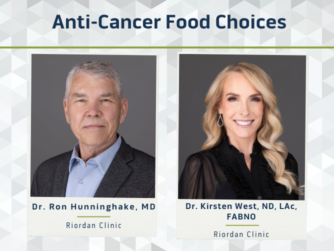
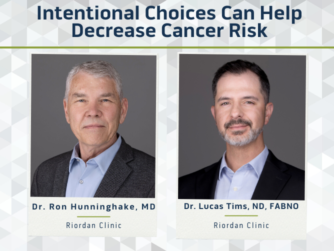
Great info, wish I was closer to your clinic
I would diffently be a patient of the clinic but live in Florida. But these podcasts really help.